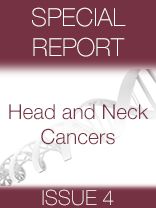Link Drawn Between Oral HPV and Risk of Head and Neck Cancers
Patients with a certain type of oral human papilloma virus (HPV) have an increased risk of developing head and neck squamous cell carcinoma, as well as oropharyngeal cancer, according to a new study.
The study, led by Ilir Agalliu, MD, ScD, and whose data were published in JAMA Oncology, showed that patients with detectable HPV 16 in their mouthwash samples were 22 times more likely to develop OPC than those without the type of virus.
Researchers from Albert Einstein College of Medicine conducted a nested case-control study, dubbed American Cancer Society Cancer Prevention Study II Nutrition Cohort and the Prostate, Lung, Colorectal, and Ovarian Cancer Screening Trial, with 96,650 participants who did not have cancer at baseline. The patients were monitored during the study for nearly 4 years.
The study found a total of 132 participants103 men and 29 women—developed HNSCC during the follow-up period, and those with oral HPV 16 detection was associated with positive association for oropharyngeal squamous cell carcinoma (OR, 22.4; 95% CI, 1.8-276.7).
HPV 16 is a well-known cause of head and neck cancers, and in a companion editorial to the study, authors Dana L. Rollison, PhD, Moffitt Cancer Center, and Maura E. Gillison, MD, PhD, Ohio State University, noted that this is the first study to demonstrate conclusively that the presence of oral HPV 16 precedes the development of oropharyngeal cancers.
“These data are remarkably consistent with risk estimates from numerous case-controls studies. However, the study by Agalliu et al contributes to the existing body of evidence by supporting a temporal association between HPV exposure and HNSCC,” the authors wrote. “By linking oral HPV detection directly to HNSCC risk, the Agalliu data have important implications for the use of oral HPV detection for OPC screening.”
The study also found that oral beta- and gamma-HPVsusually detected in the skin—were associated with the development of head and neck cancers.
Detection of β1-HPV-5 type was associated with OPC (OR, 7.42; 95% CI, 0.98-56.82; P = .054), oral cavity (OR, 5.34; 95% CI, 1.51-18.80; P = .01), and laryngeal squamous cell carcinomas (OR, 2.71; 95% CI, 1.00-7.43; P = .05).
The γ11- and γ12-HPV species were associated with both oral cavity (OR, 7.47; 95% CI, 1.21-46.17; P = .03; and OR, 6.71; 95% CI, 1.47-30.75; P = .01, respectively) and laryngeal squamous cell carcinomas (OR, 7.49; 95% CI, 1.10-51.04; P = .04 and OR, 5.31; 95% CI, 1.13-24.95; P = .03, respectively).
The study authors noted that these added associations indicate a broader role for strains of HPV in causing head and neck cancers.
The editorial also pointed out that previous studies have shown types of β-HPV infection to be a risk factor for cutaneous squamous cell carcinoma (cSCC).
Although the epidemiological data is limited, the authors suggest that an interaction between β-HPV infection and UV exposure may modify the risk of developing cSCC. Furthermore, they note that other factors such as tobacco smoking and genetics may increase incidence of HNSCC among people with oral HPV types.
The study was limited by the small size, which the authors said reflects the rarity of HNSCC, but further research may help determine if simple oral tests can indicate risk of potentially developing head and neck cancers.
“The use of easily collected oral mouthwash samples can provide a prospective marker for risk of HNSCC and oropharyngeal SCC,” the authors concluded.
References
- Agalliu I, Gapstur S, Chen Z, et al. Associations of oral α-, β-, and γ-human papillomavirus types with risk of incident head and neck cancer [published online before print January 21, 2016]. JAMA Oncol. doi: 10.1001/jamaoncol.2015.5504.
- Rollison DE, Gillison ML. The alpha, beta, gammas of orabl human papillomavirus infection and head and neck cancer risk [published online January 21, 2016]. JAMA Oncol.

Survivorship Care Promotes Evidence-Based Approaches for Quality of Life and Beyond
March 21st 2025Frank J. Penedo, PhD, explains the challenges of survivorship care for patients with cancer and how he implements programs to support patients’ emotional, physical, and practical needs.
Read More